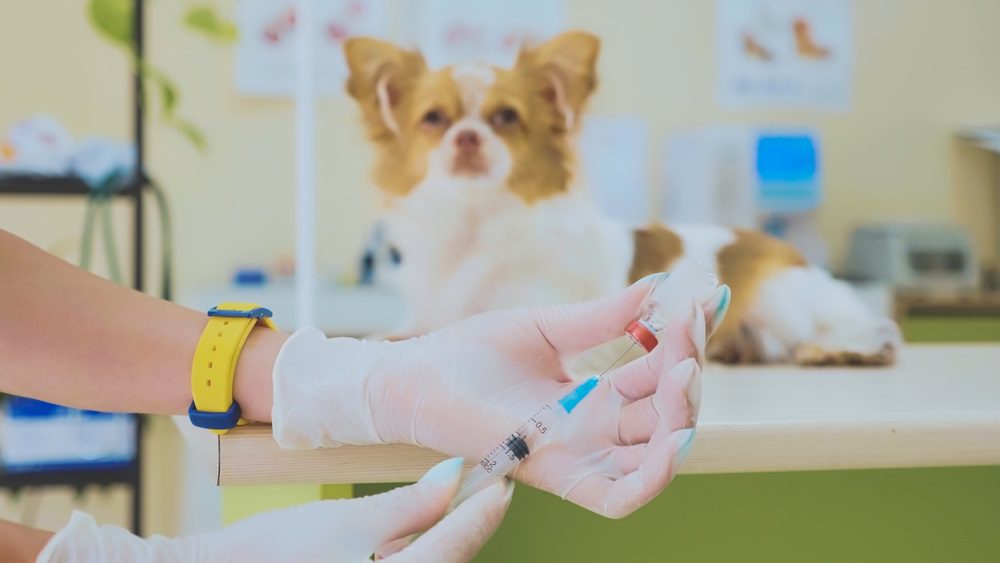DHPP And The Parainfluenza Vaccine
This is part one in our series and is everything you should know about the Parainfluenza vaccine and your dog’s potential of becoming ill.
Most veterinarians give adult dogs an annual vaccine called DHPP which is a combination vaccine for:
- Distemper
- Hepatitis
- Parainfluenza
- Parvovirus
- Coronavirus
I work in a veterinarian hospital and every day I prepare vaccines for the doctors to give to our patients. Most dog owners have no idea what vaccine their dog is getting or what they are for.
Core Vaccines vs Non-Core Vaccines
Core vaccines are all to prevent against dangerous diseases and all dogs should be protected by these vaccines. In some cases they are required by law.
Non-Core vaccines are optional and should be evaluated according to exposure risk based on where a dog lives and lifestyle of the dog. Many of these have been proven to be less effective with more adverse reactions.

The parainfluenza vaccine is considered to be a non-core vaccine.
Common Misconception
Many people confuse Parainfluenza with Canine Influenza. Symptoms are similar however Parainfluenza is a completely different disease caused by the influenza A H3N8 virus and is highly contagious. These two diseases are not related and require entirely different vaccines.
There are currently two types of the influenza virus found in the United States, H3N8 AND H3N2. Not all states have reported cases of these viruses and some have reported cases of both strains. To learn what strains have been reported in your area:
How Do Dogs Get Parainfluenza?
Parainfluenza is highly contagious and is transmitted through coughing, barking, sneezing, and licking. It can also be spread indirectly through objects such as food and water bowls, collars and leashes, or even people that have been in contact with infected dogs.
What Are The Symptoms?
Symptoms are from no symptoms at all to mild, but can be sever if the dog is very young or old or if the immunity system has been weakened because of an existing illness. These may include:
- Persistent cough
- Fever
- Nasal discharge
- Sneezing
- Eye inflammation
- Lethargy
- Loss of appetite
In the very severe cases pneumonia can develop, coughing up blood, trouble breathing or they may develop a secondary bacterial infection leading to death.
How Long Does The Vaccine Last?
The only way to know if your dog is still protected by the vaccination is to get a titer test. A titer test tells veterinarians and pet owners how much antibodies are present in a pet’s immune system.
Titer testing has become an amazing tool to prevent your dog from being over-vaccinated. Over-vaccination can be as harmful to your dog as no vaccination at all in some cases.

Should All Dogs Be Vaccinated Against Parainfluenza?
Most veterinarians recommend that all adult dogs receive the vaccine once yearly. When considering how often your dog should get the vaccine it is best to weigh risk vs benefits for your particular dog.
Dogs that are most at risk are those that:
- Have been newly adopted from a shelter or rescue center
- Are boarded
- Go to doggie day care
- Visit a groomer
- Ever go to the dog park
Keep in mind that although veterinarians do all they can to prevent the spread of disease between patients; your dog could potentially contract parainfluenza from visiting the veterinarian’s office.
The yearly vaccine topic is indeed a highly debatable topic I believe in everything in moderation. Yes, you should do all you can to prevent your dog from being over-vaccinated, but at the same time, it is extremely important to be equally sure that they are not under-vaccinated.
Just like any other business, if we all demand better vaccination care for
Did you miss the introduction to this series?
See: What No One Tells You About Canine Vaccines – Introduction
Next in this series: What No One Tells You About Canine Vaccines – Part 2, Distemper









